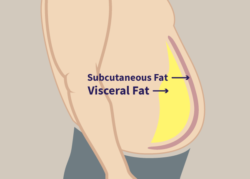
Frequently Asked Questions with Semaglutide for Weight Loss
SEMAGLUTIDE Frequently Asked Questions
What is Semaglutide?
 Semaglutide is an injectable medication (once weekly) which, when used in combination with diet and exercise, helps with blood sugar control in type 2 diabetics. It has also been shown to help with weight loss. Semaglutide belongs to a class of medications – glucagon-like peptide-1 (GLP-1) agonists, which mimic the hormone GLP-1 to lower blood sugar levels after eating.
Semaglutide is an injectable medication (once weekly) which, when used in combination with diet and exercise, helps with blood sugar control in type 2 diabetics. It has also been shown to help with weight loss. Semaglutide belongs to a class of medications – glucagon-like peptide-1 (GLP-1) agonists, which mimic the hormone GLP-1 to lower blood sugar levels after eating.
What is the hormone GLP-1?
Glucagon-like peptide 1 (GLP-1) is a hormone that causes huge effects on the regulation of blood sugar by stimulating glucose-dependent insulin secretion. Insulin is a hormone that promotes sugar uptake by the cells, stores sugar as glycogen, promotes the building of fat, and signals the body to build skeletal muscle. In addition, GLP-1 inhibits glucagon release (which slows down the release of sugar into the blood so that you burn more fat), slows down gastric emptying (makes you feel full), and lowers the desire for food intake (because you feel full).
Is Semaglutide a type of insulin?
No, Semaglutide is not a type of insulin or a substitute for insulin. Semaglutide does stimulate your pancreas to release insulin when glucose (sugar) is present. Because Semaglutide relies upon your body’s own insulin to have this effect, Semaglutide isn’t used when your pancreas can’t make insulin, such as in patients in type 1 diabetes.
Is Semaglutide a stimulant?
No, Semaglutide is not a stimulant.
How does Semaglutide work for weight loss?
GLP-1 agonists like Semaglutide help to control your blood sugar. Those taking it also tend to lose weight. GLP-1, the key hormone involved, slows down stomach emptying and in addition, can stimulate your pancreas to release insulin. Semaglutide also blocks a hormone that causes your liver to release sugar (glucagon). Together, these functions can help you feel less hungry, causing you to eat less food and lose more weight.
Does Semaglutide curb your appetite?
Yes, it is believed that Semaglutide can help curb your appetite. In addition to slowing gastric emptying to make you feel full for longer, GLP-1 also plays a role with appetite.
How long does it take to lose weight on Semaglutide?
With Semaglutide, you will slowly work your way up to the target dose at which time you will see the most amount of weight loss. We prefer to keep the max dose at 1 mg to avoid potential side effects. Clinically, we have found the max dose of 1 mg to be highly effective in our patient population. It is important to keep in mind that weight loss can take time. You will see the best results when you are using it in combination with a healthy diet and exercise. Sometimes the medication may not work for you, or you may not be able to tolerate it. Most do well.
How long should you take Semaglutide for weight loss?
Currently, Semaglutide is only FDA-approved to help with blood sugar control in type 2 diabetes and to lower the risk of major cardiovascular events (like heart attack and stroke) in people with both type 2 diabetes and heart disease. If you are taking Semaglutide for either of these reasons, you’ll take it as directed by your healthcare provider since you are using it to manage a chronic condition. But if you do not have type 2 diabetes and are looking to try Semaglutide to help with weight loss, we’ll have a better idea of long-term safety once the FDA reviews data for this new indication. What we do know is that study participants received treatment for a period of 68 weeks (about 1.5 years) during each of the four trials conducted by the company.
Is Semaglutide safe?
Yes. Semaglutide is considered to be safe and effective when used as indicated. Yet, safe doesn’t mean that there aren’t risks. Semaglutide also carries a boxed warning about thyroid C-cell tumors occurring in rodents (with unknown risk in humans), and Semaglutide shouldn’t be used if you or your family have a history of certain thyroid cancers. Semaglutide should not be used in people with type-1 diabetes or a history of pancreatitis. Semaglutide should be used cautiously for people on other blood sugar lowering medications. It should also not be used if you are under 18, pregnant, trying to get pregnant or breast feeding.
Is Semaglutide covered by my insurance?
At The Natural Path, we do not bill any insurance companies – fee for service only. If you have type 2 diabetes, you may be able to see your primary care physician and get insurance coverage in some cases.
How much Semaglutide Weight Loss Program cost?
Our Semaglutide program at The Natural Path requires an initial visit of $195. In this 30 min office visit we discuss a healthy diet; learn injection technique; do a body composition analysis and receive a Slim Shot injection. The cost of the Semaglutide program is $400/month. Injections will be dispensed monthly at your appropriate dose in pre-filled syringes.
How long until Semaglutide is approved by the FDA for weight loss?
In early December, Novo Nordisk submitted a new drug application (NDA) with priority review to the FDA. Generally, it takes the FDA about 10 months to review an application. For now, weight loss is considered an “off label” use of the medication.
Are there any foods or medications you should avoid while on Semaglutide?
Limit the amount of alcohol while taking Semaglutide, especially if diabetic. Alcohol can impact blood sugar. There is a risk that it may drop too low in combination with Semaglutide, especially if you are drinking on an empty stomach. Alcohol can also irritate your stomach.
You’ll also want to exercise caution if you are taking any oral medications as Semaglutide slows down gastric emptying. Clinical trials have not shown this to be of significance.
What are the known side effects of Semaglutide?
The common side effects are nausea, vomiting, constipation, diarrhea and stomach pain
Are there any significant health risks associated with using Semaglutide? Yes.
- Prolonged vomiting. Patients on Semaglutide can develop gastroparesis where the stomach stops moving, and patients vomit considerably. This can lead to dehydration and electrolyte imbalances. Stop using Semaglutide and call your health care provider right away if you have vomiting that persists more than a day.
- Inflammation of your pancreas (pancreatitis). Stop using Semaglutide and call your health care provider right away if you have severe pain in your stomach area (abdomen) that will not go away, with or without vomiting. You may feel the pain from your abdomen to your back.
- Changes in vision. Tell your health care provider if you have changes in vision during treatment with Semaglutide
- Low blood sugar (hypoglycemia). Your risk for getting low blood sugar may be higher if you use Semaglutide with another medicine that can cause low blood sugar, such as a sulfonylurea or insulin. Signs and symptoms of low blood sugar may include: dizziness or lightheadedness, blurred vision, anxiety, irritability or mood changes, sweating, slurred sp
 eech, hunger, confusion or drowsiness, shakiness, weakness, headache, fast heartbeat, and feeling jittery.
eech, hunger, confusion or drowsiness, shakiness, weakness, headache, fast heartbeat, and feeling jittery. - Kidney problems (kidney failure). In people who have kidney problems, diarrhea, nausea, and vomiting may cause a loss of fluids (dehydration), which may cause kidney problems to get worse. It is important for you to drink fluids to help reduce your chance of dehydration.
- Serious allergic reactions. Stop using Semaglutide and get medical help right away if you have any symptoms of a serious allergic reaction, including swelling of your face, lips, tongue, or throat; problems breathing or swallowing; severe rash or itching; fainting or feeling dizzy; or very rapid heartbeat.
Categories: AOD anti obesity drug, Body Composition, FDA and Semaglutide, Food Information, hCG Diet, HCG Weight Loss, low dose naltrexone weight loss, Medical weight loss near me, Medical weight loss portland, Semaglutide weight loss, Uncategorized, Weight Loss, Weight Loss doctor portland
